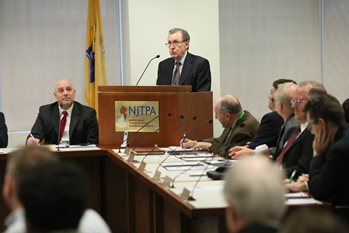
As the nation emerges from a decade of strong economic growth — which could be called the “roaring 2010’s” — New Jersey will have to address a series of demographic and affordability challenges to keep pace with other states. That is among the conclusions of the James W. Hughes, University Professor and Dean Emeritus of the Edward J. Bloustein School of Planning and Public Policy at Rutgers University, who addressed the NJTPA board at its January 13 meeting.
His presentation, “The Decade of Transformation: Economic and Demographic Disruptions,” was one in a series of presentations and forums designed to gather insights for NJTPA’s update of its long range transportation plan, with a horizon year of 2050.
Click here to view video of the presentation
Hughes began by offering statistical snapshots of the state. New Jersey has the second highest income among the 48 continental states, but he noted, “Our strong income metric often obscures our severe cost and housing affordability problem.” The state’s housing costs are the highest in the nation. In terms of transportation, the state is second in mass transit usage and third in the length of commute.
At the same time New Jersey has the densest population per square mile for any state — even higher than Japan or India — while it also has more forest acreage than states such as California or Alaska. The latter he said demonstrates “our unique environment and quality of life.”
Yet New Jersey’s job growth over the last decade of 11 percent trailed the 17 percent growth in the nation overall. He said it will likely continue to lag in coming years.
In addition to affordability and other issues, he said, the modest performance is tied to demographic shifts. In particular, the state — like the entire northeast U.S. — is losing population to states in the south and west. International migration and birth rates have helped make up for the loss.
“International migration has become our demographic engine,” he said. With 23 percent of the state population being foreign-born, immigration is a “benchmark of our unique demographic diversity and that’s a key advantage in a global economy,” Hughes said.
Other impending challenges, according to Hughes, relate to the generational transformation underway. The nation’s population is aging with more people over 65 than under 18 for the first time. While the baby boom generation still holds more than half the nation’s wealth, the smaller Generation X is poised to take over vacated leadership positions and the giant millennial generation has become the largest segment of the labor force. Its growing family formation will reshape housing and other markets. Behind them are Generation Z and Generation Alpha. Each generation is more diverse than the last, owing to immigration, he said
“A new imperative is connecting across generations, promoting social and economic linkages between young and old,” Hughes said.
Despite these concerns, Hughes remains hopeful for the future, citing a steady New Jersey economy benefitting from the nation’s continued economic expansion. But he cautions, “We may be approaching the point where the region may have to be remarketed or rebranded to compete in this new era of rolling disruptions and regional shifts.”